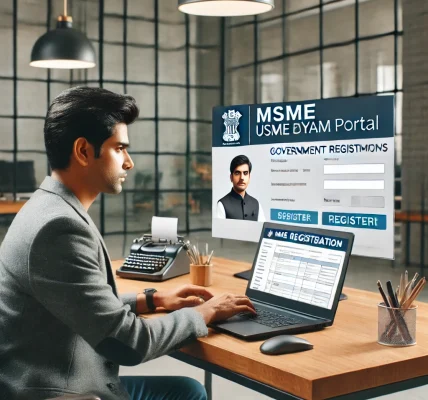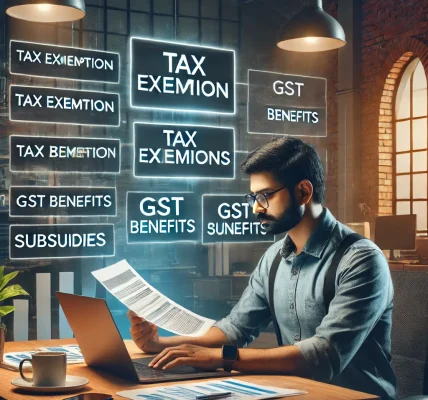In today’s globalized economy, small and medium-sized enterprises (SMEs) or Micro, Small, and Medium Enterprises (MSMEs) play a pivotal role in the development of any economy. These businesses are not only contributing to domestic growth but are also looking for opportunities to tap into international markets. With the government’s support, Indian MSMEs are now well-positioned to expand globally and explore new markets.
One of the most significant ways the government supports MSMEs in their global expansion is through Export Incentives. These incentives encourage small businesses to venture into international markets by making it easier and more affordable for them to export goods and services.
In this blog, we will explore the various export incentives available for MSMEs, how to leverage them for business growth, and the steps involved in expanding your business globally. Whether you are a startup looking to break into new markets or an established MSME considering global expansion, this guide will help you navigate the world of export incentives and make informed decisions.
Why Exporting is Crucial for MSMEs
Before delving into the specifics of export incentives, it is essential to understand why exporting is crucial for MSMEs. Expanding into international markets offers several advantages, including:
- Increased Market Reach: Exporting allows MSMEs to access a broader market base, thereby increasing sales opportunities and revenue.
- Diversification of Risk: By targeting multiple international markets, businesses can reduce their dependency on a single market, minimizing risks associated with domestic market fluctuations.
- Growth Opportunities: International expansion can lead to higher profits and brand recognition, leading to greater business stability.
- Better Capacity Utilization: Exporting helps MSMEs fully utilize their production capacity, leading to improved operational efficiency.
- Technological Advancements: International competition pushes businesses to innovate, upgrade their technology, and improve the quality of their products and services.
What Are Export Incentives for MSMEs?
Export incentives are benefits and support provided by the Indian government and other organizations to encourage MSMEs to explore international markets. These incentives are designed to make the process of exporting more affordable, reduce the financial burden on businesses, and ensure that Indian products have a competitive edge in global markets.
India has a range of schemes aimed at supporting MSMEs in their export journey. These schemes are usually offered by the Ministry of MSME, the Directorate General of Foreign Trade (DGFT), and other government bodies.
Key Export Incentives Available for MSMEs
Here’s a detailed look at some of the major export incentives available for MSMEs:
1. Merchandise Exports from India Scheme (MEIS)
The MEIS is a scheme launched by the Government of India to encourage the export of various products from India. Under this scheme, MSMEs can receive duty credit scrips as a reward for exporting specific products to target markets. The scrips can be used for paying duties on imports or can be sold to other companies. This reduces the overall cost of exports for MSMEs and makes their products more competitive in the global market.
2. Services Exports from India Scheme (SEIS)
The SEIS is similar to the MEIS but is specifically designed for service providers. It provides incentives for Indian service exporters in sectors like IT, tourism, and education. Under this scheme, MSMEs can earn duty credit scrips for their exports of services. This scheme supports a wide range of services including architecture, engineering, consultancy, and business process outsourcing (BPO).
3. Interest Equalization Scheme (IES)
The Interest Equalization Scheme provides a subsidy on export credit interest rates. This scheme offers a competitive edge to MSMEs in the international market by making it easier for them to access finance for their export activities at lower interest rates. Exporting goods can be costly, and IES helps reduce the financial burden on MSMEs by covering a portion of the interest costs.
4. Export Promotion Capital Goods (EPCG) Scheme
The EPCG Scheme allows MSMEs to import capital goods (machinery, equipment, etc.) at zero or reduced customs duties. This helps MSMEs enhance their production capacity and quality to meet international standards. In return, businesses must commit to exporting a certain percentage of their total production.
5. Market Access Initiative (MAI) Scheme
The MAI Scheme provides financial assistance to MSMEs for promoting their products in international markets. The funds under this scheme can be used for activities like organizing trade fairs, market research, and advertising. This initiative helps MSMEs raise awareness of their products and services in global markets and establish a strong presence abroad.
6. Trade Facilitation Services
The government also provides trade facilitation services through various export promotion councils, which help MSMEs identify new export opportunities, connect with international buyers, and navigate export documentation and legalities. These services also provide MSMEs with information on the latest export trends, regulations, and market conditions.
7. Export Credit Guarantee Corporation of India (ECGC) Insurance
The ECGC provides credit insurance to MSMEs against the risk of non-payment by foreign buyers. This scheme ensures that MSMEs are protected in case of delayed payments or default on payment by international clients. With the backing of ECGC insurance, MSMEs are more likely to engage in foreign trade, knowing that the financial risks are mitigated.
8. GST Refund on Export Goods
Under the Goods and Services Tax (GST) regime, MSMEs can avail of a refund for the GST paid on export goods. The refund process ensures that MSMEs do not incur any additional tax burden when exporting goods, making the entire export process more affordable and efficient.
9. Duty Drawback Scheme
The Duty Drawback Scheme allows MSMEs to claim a refund of customs duties paid on imported materials used in the manufacture of exported goods. This scheme reduces the overall production cost for exporters and makes their products more competitive in the global market.
10. Technology Upgradation Fund Scheme (TUFS)
The TUFS scheme offers financial support to MSMEs for upgrading their technology. With this scheme, businesses can obtain subsidies to invest in modern equipment and machinery that enhance the quality of their products, making them more marketable in global markets.
How MSMEs Can Leverage Export Incentives for Global Expansion
While there are numerous export incentives available, it’s crucial for MSMEs to understand how to effectively leverage them for successful international expansion. Here are some tips to help MSMEs utilize export incentives:
- Conduct Market Research: Before applying for any export incentives, it’s essential to research global markets and identify the ones that offer the most potential. Understanding market demands, consumer preferences, and competition will help MSMEs make informed decisions on where to focus their export efforts.
- Consult Export Promotion Agencies: MSMEs should consult export promotion agencies and trade bodies to better understand the available incentives and how to apply for them. These agencies can provide valuable guidance on the documentation and procedures involved.
- Focus on Quality: To be successful in international markets, MSMEs must prioritize quality. Using export incentives like the EPCG Scheme to upgrade machinery and technology can help improve the quality of products and make them more attractive to global buyers.
- Understand Export Documentation: Exporting involves a lot of paperwork and legal documentation. MSMEs should familiarize themselves with export-related documents such as invoices, packing lists, bills of lading, and certificates of origin.
- Leverage Government Schemes: MSMEs should actively apply for schemes like MEIS, SEIS, and MAI to offset the costs of exporting and improve their global competitiveness. These schemes can help reduce the financial burden and make it easier to enter international markets.
- Partner with Export Credit Agencies: Engaging with agencies like ECGC can provide MSMEs with insurance against non-payment risks, making it safer to do business with international buyers.
Conclusion: Unlocking Global Opportunities for MSMEs
Expanding your business globally can be a game-changer, and export incentives play a vital role in making that transition smoother for MSMEs. By taking full advantage of the various incentives provided by the government, MSMEs can reduce their financial burden, enhance competitiveness, and explore lucrative international markets.
With the right guidance and strategic approach, MSMEs can achieve global success and contribute to India’s economic growth. Whether it’s through financial incentives, marketing support, or access to export credit, there’s no reason why your MSME can’t thrive in the global market.




